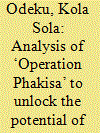| Srl | Item |
| 1 |
ID:
178277


|
|
|
|
|
| Summary/Abstract |
South Africa is endowed with vast ocean resources and wealth which have the potential to provide enormous socio-economic goods and services to the people and create massive economic growth and wealth if vigorously explored and tapped. This assertion is made against the backdrop of the recent government strategical initiative, under the auspices of ‘Operation Phakisa’, to unlock and explore the full potential of the ocean’s wealth to drive economic growth, create jobs and alleviate poverty. This paper seeks to accentuate that the Operation Phakisa initiative has the potential to strategically unlock underexplored ocean resources for purposes of creating sustainable economic growth, development, and alleviation of hunger and poverty. It concludes that effective and sustainable use of the ocean’s wealth depends on good, efficient governance policies, practices and management. Methodically, a qualitative non-empirical research approach was adopted and utilized in this study by sourcing, drawing upon and using information and insights from contemporary literature to address identified problems.
|
|
|
|
|
|
|
|
|
|
|
|
|
|
|
|
| 2 |
ID:
105178


|
|
|
|
|
| Publication |
2011.
|
| Summary/Abstract |
Does globalization's impact on the labor market affect how people vote? I address this question using a new dataset based on plant-level data that measures the impact of foreign competition on the U.S. workforce over an 8-year period. Analyzing change in the president's vote share, I find that voters were substantially more sensitive to the loss of local jobs when it resulted from foreign competition, particularly from offshoring, than to job losses caused by other factors. Yet, I also find that between 2000 and 2004, the anti-incumbent effect of trade-related job losses was smaller in areas where the government certified more of the harmed workers to receive special job training and income assistance. The findings have implications for understanding the impact of international economic integration on voting behavior, as well as for assessing the electoral effect of government programs designed to compensate the losers from globalization.
|
|
|
|
|
|
|
|
|
|
|
|
|
|
|
|
| 3 |
ID:
157372


|
|
|
|
|
| Summary/Abstract |
Re-engineering job and employment is not an issue but it is a need for man power utilization for the development of the country. It has focussed on the four key points - Opportunity re-engineering, Re-engineering learner’s competency, Capacity re –engineering and Readiness for country needs. This article has covered the technical parameters for re-engineering job and their outcomes for nation building.
|
|
|
|
|
|
|
|
|
|
|
|
|
|
|
|
| 4 |
ID:
118827


|
|
|
|
|
| Publication |
2013.
|
| Summary/Abstract |
We analyze the return on investment of the U.S. federal government's clean coal technology (CCT) program for the period 2000-2020. We estimate total costs to government and industry and quantify benefits for: (1) Reduced capital costs of advanced technologies in new plants; (2) Reduced capital and operating costs at existing plants to remain compliant with environmental regulations; (3) Reduced fuel costs due to higher efficiencies; (4) Avoided environmental costs; (5) The value of clean coal technology export sales; (6) Jobs created. We find that benefits over the 20-year period total $111 billion (2008 dollars); the benefits in individual categories range from $15 billion in fuel cost savings to $39 billion for capital and technology cost savings in new and existing plants; and that total jobs created exceed 1.2 million, with an annual average of about 60,000 jobs created. We also find that the return on investment to DOE from the CCT program is favorable and is growing rapidly: By 2020, the cumulative DOE costs will likely total $8.5 billion, for an ROI of more than 13.
|
|
|
|
|
|
|
|
|
|
|
|
|
|
|
|